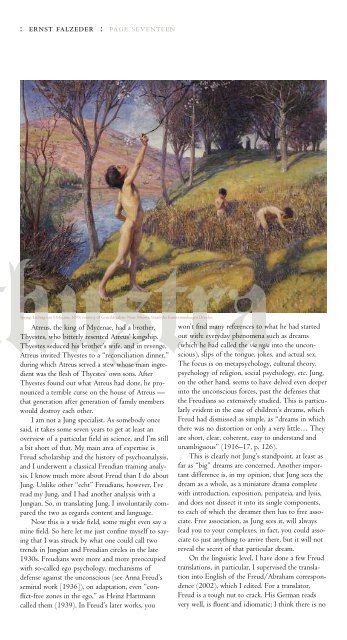a semi-annual publication of the philem n foundation - Philemon ...
a semi-annual publication of the philem n foundation - Philemon ...
a semi-annual publication of the philem n foundation - Philemon ...
You also want an ePaper? Increase the reach of your titles
YUMPU automatically turns print PDFs into web optimized ePapers that Google loves.
: ernst falzeder : page seventeen<br />
Spring, Ludwig von H<strong>of</strong>mann, 1895, courtesy <strong>of</strong> Gemäldegalerie Neue Meister, Staatliche Kunstsammlungen Dresden<br />
Atreus, <strong>the</strong> king <strong>of</strong> Mycenae, had a bro<strong>the</strong>r,<br />
Thyestes, who bitterly resented Atreus’ kingship.<br />
Thyestes seduced his bro<strong>the</strong>r’s wife, and in revenge,<br />
Atreus invited Thyestes to a “reconciliation dinner,”<br />
during which Atreus served a stew whose main ingredient<br />
was <strong>the</strong> flesh <strong>of</strong> Thyestes’ own sons. After<br />
Thyestes found out what Atreus had done, he pronounced<br />
a terrible curse on <strong>the</strong> house <strong>of</strong> Atreus —<br />
that generation after generation <strong>of</strong> family members<br />
would destroy each o<strong>the</strong>r.<br />
I am not a Jung specialist. As somebody once<br />
said, it takes some seven years to get at least an<br />
overview <strong>of</strong> a particular field in science, and I’m still<br />
a bit short <strong>of</strong> that. My main area <strong>of</strong> expertise is<br />
Freud scholarship and <strong>the</strong> history <strong>of</strong> psychoanalysis,<br />
and I underwent a classical Freudian training analysis.<br />
I know much more about Freud than I do about<br />
Jung. Unlike o<strong>the</strong>r “echt” Freudians, however, I’ve<br />
read my Jung, and I had ano<strong>the</strong>r analysis with a<br />
Jungian. So, in translating Jung, I involuntarily compared<br />
<strong>the</strong> two as regards content and language.<br />
Now this is a wide field, some might even say a<br />
mine field. So here let me just confine myself to saying<br />
that I was struck by what one could call two<br />
trends in Jungian and Freudian circles in <strong>the</strong> late<br />
1930s. Freudians were more and more preoccupied<br />
with so-called ego psychology, mechanisms <strong>of</strong><br />
defense against <strong>the</strong> unconscious (see Anna Freud’s<br />
<strong>semi</strong>nal work [1936]), on adaptation, even “conflict-free<br />
zones in <strong>the</strong> ego,” as Heinz Hartmann<br />
called <strong>the</strong>m (1939). In Freud’s later works, you<br />
won’t find many references to what he had started<br />
out with: everyday phenomena such as dreams<br />
(which he had called <strong>the</strong> via regia into <strong>the</strong> unconscious),<br />
slips <strong>of</strong> <strong>the</strong> tongue, jokes, and actual sex.<br />
The focus is on metapsychology, cultural <strong>the</strong>ory,<br />
psychology <strong>of</strong> religion, social psychology, etc. Jung,<br />
on <strong>the</strong> o<strong>the</strong>r hand, seems to have delved even deeper<br />
into <strong>the</strong> unconscious forces, past <strong>the</strong> defenses that<br />
<strong>the</strong> Freudians so extensively studied. This is particularly<br />
evident in <strong>the</strong> case <strong>of</strong> children’s dreams, which<br />
Freud had dismissed as simple, as “dreams in which<br />
<strong>the</strong>re was no distortion or only a very little… They<br />
are short, clear, coherent, easy to understand and<br />
unambiguous” (1916–17, p. 126).<br />
This is clearly not Jung’s standpoint, at least as<br />
far as “big” dreams are concerned. Ano<strong>the</strong>r important<br />
difference is, in my opinion, that Jung sees <strong>the</strong><br />
dream as a whole, as a miniature drama complete<br />
with introduction, exposition, peripateia, and lysis,<br />
and does not dissect it into its single components,<br />
to each <strong>of</strong> which <strong>the</strong> dreamer <strong>the</strong>n has to free associate.<br />
Free association, as Jung sees it, will always<br />
lead you to your complexes, in fact, you could associate<br />
to just anything to arrive <strong>the</strong>re, but it will not<br />
reveal <strong>the</strong> secret <strong>of</strong> that particular dream.<br />
On <strong>the</strong> linguistic level, I have done a few Freud<br />
translations, in particular, I supervised <strong>the</strong> translation<br />
into English <strong>of</strong> <strong>the</strong> Freud/Abraham correspondence<br />
(2002), which I edited. For a translator,<br />
Freud is a tough nut to crack. His German reads<br />
very well, is fluent and idiomatic; I think <strong>the</strong>re is no


